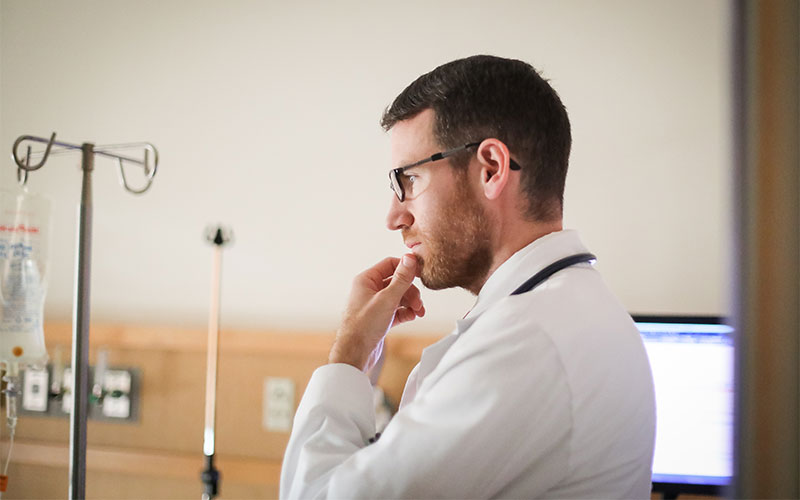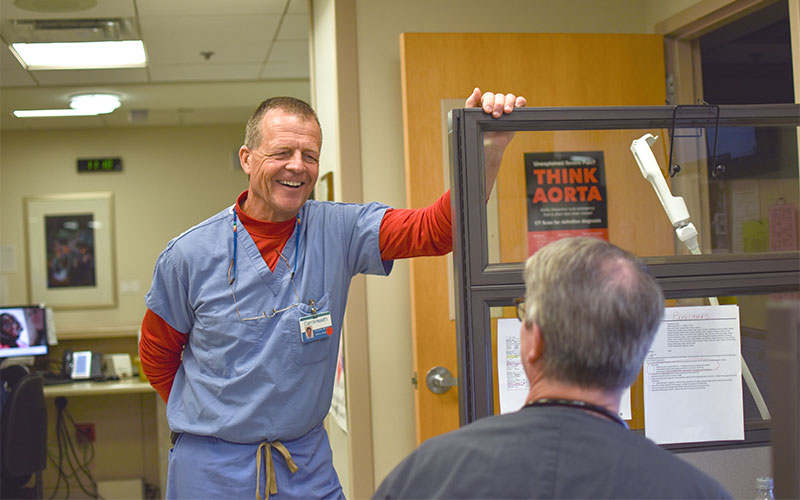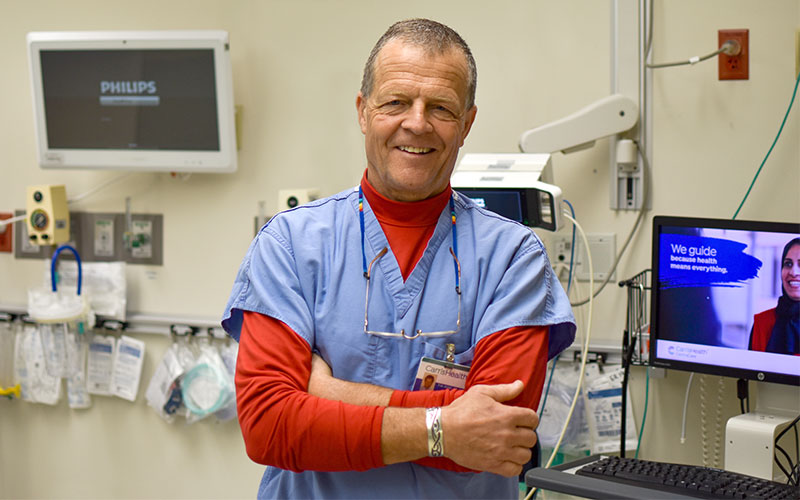Celebrating 15 Years of Hospital Medicine in Willmar
At CentraCare - Rice Memorial Hospital, Dr. Fred Hund enters the room and introduces himself to his first patient of the day.
“Good morning, I’m Dr. Hund, a hospital medicine physician. We take care of patients when they need to be in the hospital. We work closely with your primary doctor, to keep her informed while you’re here.”
The elderly woman was brought into the emergency room with shortness of breath. It turned out she had pneumonia.
“I’m going to listen to your lungs and your heart, okay?”
After examining the woman, Dr. Hund sits down to talk with the patient about her pneumonia and what she can expect during her time in the hospital.
Dr. Hund is one of six full time physicians and a physician assistant that work in hospital medicine at Rice Memorial Hospital currently. The specialists care for patients from the time a patient is admitted to the hospital until they are sent home.
Developing a Hospital Medicine Program
“I’ve always liked taking care of sick people,” Hund says. “For me I enjoy hospital practice more than when I was in the clinic with an office practice.”
Hospital Medicine began growing nationwide as a specialty in the late 1990s, and in 2019 the profession celebrated its 23rd birthday.
Before this time, primary care doctors rounded on their patients when they were hospitalized. They fit in visits to the hospital first thing in the morning, in between clinic appointments, or at the end of their busy day.
Now, hospitalists care for these patients in nearly all hospitals the size of Rice Hospital and larger.
“We’re good at this, this is all we do,” says Hund. “We have a hospitalist available 24/7, 365 days a year. I can see someone 2-3 times a day, or 4-5 times a day if they’re in the intensive care unit. We also have hospitalists who are available during the night, or whenever is the best time for a family who wants to ask questions.”
Back in the 1990s, ambulatory care in the office was becoming more complex, as was hospital care. It was a challenge for doctors to stay efficient and skilled doing both.

Hospitalist, Dr. Mike May, rounds on a patient in the hospital
In 2005, after practicing as a general Internist for 17 years at ACMC in Willmar, Dr. Hund became the first hospitalist at Rice Memorial Hospital. Dr. Mike May joined as the second full time hospitalist in 2009.
When the program began hospitalists had limited coverage in the hospital. As it grew and more hospitalists were added they became responsible for all adult patients at Rice Hospital who are over the age of 18 and not pregnant.
“This is the direction care is being delivered nationwide,” Hund says. “As Rice Hospital grows, we will continue to need more hospitalists.”
The valuable role of hospitalists
Hospital Medicine has made inpatient care more efficient for hospitalized patients as well as their primary care doctors.
In addition to their 24-hour availability and responsibilities to patients, hospitalists also work to improve the performance and efficiency of hospitals. This can include quality and process improvement; efficient use of hospital resources; and enhanced collaboration and communication with all patient care providers.
Dr. Ken Flowe is Physician Vice President of Acute Care for Carris Health – Rice Memorial Hospital.
“The work our hospitalists perform is vital,” Flowe says. “With hospitalists we can better coordinate care, provide shorter lengths of stay for our patients and decrease costs.”
The team of hospitalists at CentraCare - Rice Memorial Hospital are also on the frontline during an infectious disease outbreak, such as the COVID-19 pandemic. “Since they are not preoccupied by complex outpatients, hospitalists provide a critical benefit to complex inpatients,” says Flowe. “With the current coronavirus situation, we are making plans to greatly increase our capacity, if necessary, for a surge of seriously ill patients.”
Making the transition from inpatient to outpatient

Dr. Hund speaks with Emergency Services physician, Dr. Eric Westberg
An important part of a hospitalist’s role is when it’s time for a patient to leave the hospital and return home. “Transitions of care, such as returning home,” adds Flowe, “are very high-risk situations and our hospitalists take the time and energy to ensure that this is done safely and efficiently, avoiding complications and readmissions.”
“It’s our responsibility to ensure every patient has detailed discharge instructions including information on medications and any follow-up appointments before they leave the hospital,” said Hund. “With technology and the efficiency of electronic medical records, the hand-off to the patient’s primary care provider is seamless.” Often times the primary physician will know everything about the patient’s transition before they have even left the hospital.
“It takes a village to care for our patients,” Dr. Hund points out. “Communication between the hospitalist and the primary care and specialty physicians ensures optimal patient outcomes and reduces hospital readmissions.”
A team of hospitalists
Hospitalists work together as a team to develop a variety of scheduling options. At Rice, they utilize block scheduling which varies with doctors who are full or part time, and available certain days each month. A hospitalist could work 4-5 days in a row, or 10-12 days in a row depending on that month’s schedule.
“There are many advantages to this type of scheduling,” explains Hund. “If a patient is in the hospital for five days, they don’t want to be introduced to a different physician each day. It’s comforting to have the same hospitalist working with patients and their families.”
While Rice Memorial Hospital does have a couple nocturnists, a hospital-based physician who only works overnight, all of the hospitalists help to cover night shifts and rotate as needed.
“We have excellent partners who are good folks, smart and really great to work with,” shares Hund. “We are fortunate to have built a first-rate Hospital Medicine team and we learn from each other all the time.”
